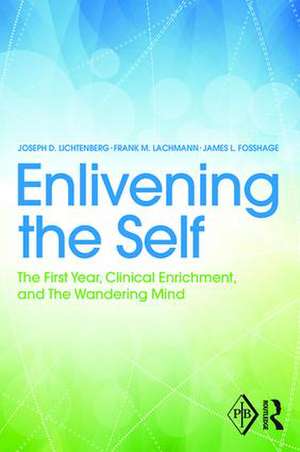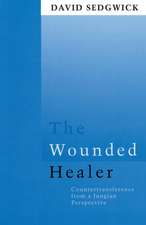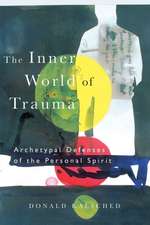Enlivening the Self: The First Year, Clinical Enrichment, and The Wandering Mind: Psychoanalytic Inquiry Book Series
Autor Joseph Lichtenberg, Frank Lachmann, James Fosshageen Limba Engleză Paperback – 28 sep 2015
The book is divided into three essays:
Infancy – Joseph Lichtenberg presents extensive reviews of observation and research on the first year of life. Based on these reviews, he delineates twelve foundational qualities and capacities of the self as a doer doing, initiating and responding, activating and taking in.
Exploratory therapy – James L. Fosshage looks where therapeutic change is entwined with development. There are many sources illustrated for enhancing the sense of self, and Frank M. Lachmann pays particular attention to humor and to the role that the twelve qualities and capacities play in the therapeutic process.
The wandering mind – Frank M. Lachmann covers the neuroscience and observation that "mind wandering" is related to the immediacy of the sense of self linking now with past and future.
Throughout the book the authors’ arguments are illustrated with rich clinical vignettes and suggestions for clinical practice. This title will be a must for psychoanalysts, including trainees in psychoanalysis, psychiatry residents and candidates at psychoanalytic institutes and also graduate students in clinical and counselling psychology programs.
| Toate formatele și edițiile | Preț | Express |
|---|---|---|
| Paperback (1) | 367.71 lei 43-57 zile | |
| Taylor & Francis – 28 sep 2015 | 367.71 lei 43-57 zile | |
| Hardback (1) | 1379.89 lei 43-57 zile | |
| Taylor & Francis – 5 oct 2015 | 1379.89 lei 43-57 zile |
Din seria Psychoanalytic Inquiry Book Series
- 5%
 Preț: 212.10 lei
Preț: 212.10 lei - 5%
 Preț: 316.41 lei
Preț: 316.41 lei - 5%
 Preț: 217.34 lei
Preț: 217.34 lei - 5%
 Preț: 265.58 lei
Preț: 265.58 lei - 5%
 Preț: 365.07 lei
Preț: 365.07 lei - 5%
 Preț: 440.11 lei
Preț: 440.11 lei - 5%
 Preț: 315.99 lei
Preț: 315.99 lei - 5%
 Preț: 202.90 lei
Preț: 202.90 lei - 5%
 Preț: 232.25 lei
Preț: 232.25 lei - 5%
 Preț: 204.81 lei
Preț: 204.81 lei - 17%
 Preț: 333.64 lei
Preț: 333.64 lei - 5%
 Preț: 353.28 lei
Preț: 353.28 lei - 5%
 Preț: 1379.89 lei
Preț: 1379.89 lei - 5%
 Preț: 387.11 lei
Preț: 387.11 lei - 5%
 Preț: 373.96 lei
Preț: 373.96 lei - 5%
 Preț: 374.35 lei
Preț: 374.35 lei - 5%
 Preț: 441.87 lei
Preț: 441.87 lei - 5%
 Preț: 320.86 lei
Preț: 320.86 lei -
 Preț: 338.70 lei
Preț: 338.70 lei - 5%
 Preț: 1445.29 lei
Preț: 1445.29 lei - 5%
 Preț: 1382.58 lei
Preț: 1382.58 lei - 5%
 Preț: 373.96 lei
Preț: 373.96 lei - 13%
 Preț: 304.01 lei
Preț: 304.01 lei -
 Preț: 415.05 lei
Preț: 415.05 lei - 5%
 Preț: 370.39 lei
Preț: 370.39 lei - 11%
 Preț: 278.06 lei
Preț: 278.06 lei - 5%
 Preț: 391.62 lei
Preț: 391.62 lei - 5%
 Preț: 388.93 lei
Preț: 388.93 lei - 5%
 Preț: 371.27 lei
Preț: 371.27 lei - 5%
 Preț: 449.82 lei
Preț: 449.82 lei - 5%
 Preț: 320.04 lei
Preț: 320.04 lei - 5%
 Preț: 1067.26 lei
Preț: 1067.26 lei -
 Preț: 430.79 lei
Preț: 430.79 lei - 5%
 Preț: 357.07 lei
Preț: 357.07 lei - 5%
 Preț: 1074.45 lei
Preț: 1074.45 lei - 5%
 Preț: 341.72 lei
Preț: 341.72 lei
Preț: 367.71 lei
Preț vechi: 387.06 lei
-5% Nou
Puncte Express: 552
Preț estimativ în valută:
70.37€ • 73.10$ • 58.45£
70.37€ • 73.10$ • 58.45£
Carte tipărită la comandă
Livrare economică 03-17 februarie 25
Preluare comenzi: 021 569.72.76
Specificații
ISBN-13: 9781138809727
ISBN-10: 1138809721
Pagini: 172
Ilustrații: 5 black & white illustrations
Dimensiuni: 156 x 234 x 10 mm
Greutate: 0.27 kg
Ediția:1
Editura: Taylor & Francis
Colecția Routledge
Seria Psychoanalytic Inquiry Book Series
Locul publicării:Oxford, United Kingdom
ISBN-10: 1138809721
Pagini: 172
Ilustrații: 5 black & white illustrations
Dimensiuni: 156 x 234 x 10 mm
Greutate: 0.27 kg
Ediția:1
Editura: Taylor & Francis
Colecția Routledge
Seria Psychoanalytic Inquiry Book Series
Locul publicării:Oxford, United Kingdom
Public țintă
Postgraduate, Professional, and Professional Practice & DevelopmentCuprins
Part I: The First Year of Life. Part II: Clinical Guidelines. Part III: The Wandering Mind. Afterword: Toward a Metatheory -A Diagrammatic Portrayal.
Notă biografică
Joseph D. Lichtenberg , MD, is Editor-in-Chief of Psychoanalytic Inquiry, Director Emeritus of the Institute of Contemporary Psychotherapy and Psychoanalysis, past President of the International Council for Psychoanalytic Self Psychology, and a member of the Program Committee of the American Psychoanalytic Association.
James L. Fosshage , PhD, is Founding President, International Association for Psychoanalytic Self Psychology (IAPSP); Co-Founder, Board Director and Faculty, National Institute for the Psychotherapies; Founding Faculty, Institute for the Psychoanalytic Study of Subjectivity; Clinical Professor of Psychology, New York University Postdoctoral Program in Psychotherapy and Psychoanalysis. (His website is www.jamesfosshage.net.)
Frank M. Lachmann , PhD, is a founding faculty member of the Institute for the Psychoanalytic Study of Subjectivity, Training and Supervising Analyst, Postgraduate Center for Mental Health, and Clinical Assistant Professor at the NYU Postdoctoral Program in Psychotherapy and Psychoanalysis.
James L. Fosshage , PhD, is Founding President, International Association for Psychoanalytic Self Psychology (IAPSP); Co-Founder, Board Director and Faculty, National Institute for the Psychotherapies; Founding Faculty, Institute for the Psychoanalytic Study of Subjectivity; Clinical Professor of Psychology, New York University Postdoctoral Program in Psychotherapy and Psychoanalysis. (His website is www.jamesfosshage.net.)
Frank M. Lachmann , PhD, is a founding faculty member of the Institute for the Psychoanalytic Study of Subjectivity, Training and Supervising Analyst, Postgraduate Center for Mental Health, and Clinical Assistant Professor at the NYU Postdoctoral Program in Psychotherapy and Psychoanalysis.
Recenzii
"In this, their fourth co-authored book, the amazing trio of Lichtenberg, Lachmann, and Fosshage has creatively expanded and deepened their own already impressive contributions to the study of self-experience, exploring the process of, as they term it here, Enlivening the Self.
Two modes of experience are scrutinized in order to conceptualise how an enlivened sense of self develops, both in infancy and then throughout life. The first mode concerns the author’s more familiar territory, the individual’s experience of self when he or she is attending to a specific motivational task. But even here, within their more well-travelled realm of motivational systems, the authors have something very new to offer, the elaboration of twelve research and observation-based qualities or capacities that emerge during the first year of life and that potentially serve as life-long sources of enlivenment.
These twelve qualities are explored in the first essay of the volume, focused on infancy, and also in the second essay, demonstrating their clinical usefulness in the adult through two well elaborated case examples. The third essay is focussed in entirely new and original territory: the individual’s sense of self when he or she is not focussed on a task, when his or her mind wanders, exploring, in this, their initial foray on the topic, how such mind wandering enlivens the self. The concept of mind wandering, as is always the case with these authors, is based in explorative research and clinical observation, and brings to our awareness an exciting and novel perspective on self-development.This is a wonderful book. I can only recommend that you see for yourself."
–Estelle Shane, Ph.D., is a Training and Supervising Analyst at the Institute of Contemporary Psychoanalysis in Los Angeles and a Training and Supervising Analyst at the New Center for Psychoanalysis in Los Angeles.
"In this, their fourth co-authored book, the amazing trio of Lichtenberg, Lachmann, and Fosshage has creatively expanded and deepened their own already impressive contributions to the study of self-experience, exploring the process of, as they term it here, Enlivening the Self.
Two modes of experience are scrutinized in order to conceptualise how an enlivened sense of self develops, both in infancy and then throughout life. The first mode concerns the author’s more familiar territory, the individual’s experience of self when he or she is attending to a specific motivational task. But even here, within their more well-travelled realm of motivational systems, the authors have something very new to offer, the elaboration of twelve research and observation-based qualities or capacities that emerge during the first year of life and that potentially serve as life-long sources of enlivenment.
These twelve qualities are explored in the first essay of the volume, focused on infancy, and also in the second essay, demonstrating their clinical usefulness in the adult through two well elaborated case examples. The third essay is focussed in entirely new and original territory: the individual’s sense of self when he or she is not focussed on a task, when his or her mind wanders, exploring, in this, their initial foray on the topic, how such mind wandering enlivens the self. The concept of mind wandering, as is always the case with these authors, is based in explorative research and clinical observation, and brings to our awareness an exciting and novel perspective on self-development.This is a wonderful book. I can only recommend that you see for yourself."
–Estelle Shane, Ph.D., is a Training and Supervising Analyst at the Institute of Contemporary Psychoanalysis in Los Angeles and a Training and Supervising Analyst at the New Center for Psychoanalysis in Los Angeles.
"The text is beautifully fleshed out with what is evidently great experience from all three authors... [This] book provides clear concise material to give an overall understanding of the concept without economising on the necessary vignettes that never fail to bring an example to life. In the same breath, this lso encourages the reader to evaluate their own clinical work in this way... [This] structure provides on very useful way of making sense of human complexity. A deeply thought-provoking, challenging, yet enjoyable book."
-Candy Wong, Senior Mental Health Practitioner, Souther Health NHS Foundation Trust, and counselling psychologist in training, University of East London, The Psychologist
"[Slim] but densely thought-provoking... Strengths of this book include the marriage of neuroscience and observational data with analytic theory... The combination of amiable tone and incisive language allows readers to absorb a great deal of scholarly content for so few pages. The novel exploration of self-enlivening in a non-task-focused mind state is exciting and well placed at the end of the book as a springboard for future investigations... The authors of this book most certainly achieved what they set out to do; they have created a work that is inclusive of such a reader and which left this reviewer eager to learn more.... [A] tree is an apt metaphorical image for the book itself: It is rooted in classic psychoanalytic theory; its trunk is built of the sturdy stuff of more contemproary theories; its crown springs from evidence found in clinical observational, and neuroscience sources regarding child dvelopment and therapy, with branches that stretch into exploration of developmental processes as they emerge in both task-oriented and non-task-oriented mind states."
-Dr. Lauren E. Linn, University of Bridgeport, PsycCritiques
Two modes of experience are scrutinized in order to conceptualise how an enlivened sense of self develops, both in infancy and then throughout life. The first mode concerns the author’s more familiar territory, the individual’s experience of self when he or she is attending to a specific motivational task. But even here, within their more well-travelled realm of motivational systems, the authors have something very new to offer, the elaboration of twelve research and observation-based qualities or capacities that emerge during the first year of life and that potentially serve as life-long sources of enlivenment.
These twelve qualities are explored in the first essay of the volume, focused on infancy, and also in the second essay, demonstrating their clinical usefulness in the adult through two well elaborated case examples. The third essay is focussed in entirely new and original territory: the individual’s sense of self when he or she is not focussed on a task, when his or her mind wanders, exploring, in this, their initial foray on the topic, how such mind wandering enlivens the self. The concept of mind wandering, as is always the case with these authors, is based in explorative research and clinical observation, and brings to our awareness an exciting and novel perspective on self-development.This is a wonderful book. I can only recommend that you see for yourself."
–Estelle Shane, Ph.D., is a Training and Supervising Analyst at the Institute of Contemporary Psychoanalysis in Los Angeles and a Training and Supervising Analyst at the New Center for Psychoanalysis in Los Angeles.
"In this, their fourth co-authored book, the amazing trio of Lichtenberg, Lachmann, and Fosshage has creatively expanded and deepened their own already impressive contributions to the study of self-experience, exploring the process of, as they term it here, Enlivening the Self.
Two modes of experience are scrutinized in order to conceptualise how an enlivened sense of self develops, both in infancy and then throughout life. The first mode concerns the author’s more familiar territory, the individual’s experience of self when he or she is attending to a specific motivational task. But even here, within their more well-travelled realm of motivational systems, the authors have something very new to offer, the elaboration of twelve research and observation-based qualities or capacities that emerge during the first year of life and that potentially serve as life-long sources of enlivenment.
These twelve qualities are explored in the first essay of the volume, focused on infancy, and also in the second essay, demonstrating their clinical usefulness in the adult through two well elaborated case examples. The third essay is focussed in entirely new and original territory: the individual’s sense of self when he or she is not focussed on a task, when his or her mind wanders, exploring, in this, their initial foray on the topic, how such mind wandering enlivens the self. The concept of mind wandering, as is always the case with these authors, is based in explorative research and clinical observation, and brings to our awareness an exciting and novel perspective on self-development.This is a wonderful book. I can only recommend that you see for yourself."
–Estelle Shane, Ph.D., is a Training and Supervising Analyst at the Institute of Contemporary Psychoanalysis in Los Angeles and a Training and Supervising Analyst at the New Center for Psychoanalysis in Los Angeles.
"The text is beautifully fleshed out with what is evidently great experience from all three authors... [This] book provides clear concise material to give an overall understanding of the concept without economising on the necessary vignettes that never fail to bring an example to life. In the same breath, this lso encourages the reader to evaluate their own clinical work in this way... [This] structure provides on very useful way of making sense of human complexity. A deeply thought-provoking, challenging, yet enjoyable book."
-Candy Wong, Senior Mental Health Practitioner, Souther Health NHS Foundation Trust, and counselling psychologist in training, University of East London, The Psychologist
"[Slim] but densely thought-provoking... Strengths of this book include the marriage of neuroscience and observational data with analytic theory... The combination of amiable tone and incisive language allows readers to absorb a great deal of scholarly content for so few pages. The novel exploration of self-enlivening in a non-task-focused mind state is exciting and well placed at the end of the book as a springboard for future investigations... The authors of this book most certainly achieved what they set out to do; they have created a work that is inclusive of such a reader and which left this reviewer eager to learn more.... [A] tree is an apt metaphorical image for the book itself: It is rooted in classic psychoanalytic theory; its trunk is built of the sturdy stuff of more contemproary theories; its crown springs from evidence found in clinical observational, and neuroscience sources regarding child dvelopment and therapy, with branches that stretch into exploration of developmental processes as they emerge in both task-oriented and non-task-oriented mind states."
-Dr. Lauren E. Linn, University of Bridgeport, PsycCritiques
Descriere
In psychoanalysis, enlivenment is seen as residing in a sense of self, and this sense of self is drawn from and shaped by lived experience. Enlivening the Self: The First Year, Clinical Enrichment, and the Wandering Mind describes the vitalizing and enrichment of self-experience throughout the life cycle and shows how active experience draws on many fundamental functional capacities, and these capacities come together in support of systems of motivation; that is, organized dynamic grouping of affects, intentions and goal.













